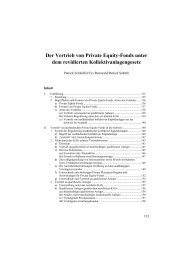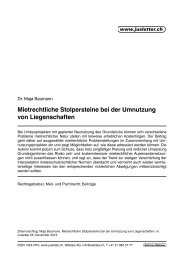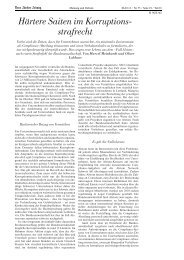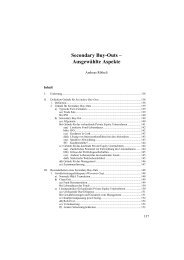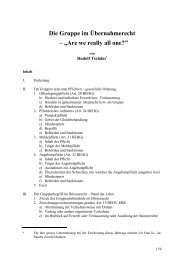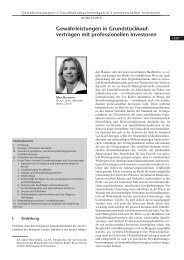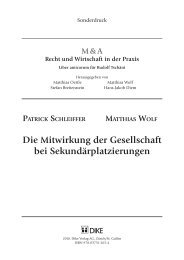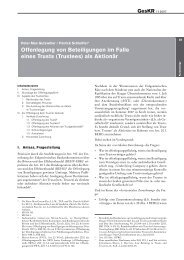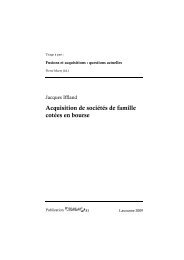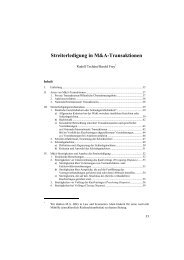Cross-border financial serv - Lenz & Staehelin
Cross-border financial serv - Lenz & Staehelin
Cross-border financial serv - Lenz & Staehelin
You also want an ePaper? Increase the reach of your titles
YUMPU automatically turns print PDFs into web optimized ePapers that Google loves.
Shelby R. du Pasquier / Philipp Fischer – <strong>Cross</strong>-<strong>border</strong> <strong>financial</strong> <strong>serv</strong>ices in and from Switzerland GesKR 4 2010<br />
between non-banking securities dealers and banks benefiting<br />
from an additional license as a securities dealer 42 .<br />
2.2 Exemption for cross-<strong>border</strong> activities<br />
The SESTA provides for a liberal regime for cross-<strong>border</strong><br />
activities, which is closely modeled on the one applicable<br />
to cross-<strong>border</strong> banking activities and thus hinges<br />
upon a similar «physical presence» test 43 . The inbound<br />
offering of securities dealer <strong>serv</strong>ices is not regulated in<br />
Switzerland 44 , except if the foreign securities dealer 45<br />
maintains a branch or a representative office in Switzerland:<br />
• A Swiss branch exists if individuals, located permanently<br />
in Switzerland and acting in a professional<br />
capacity, in or from Switzerland, either (A) trade in<br />
securities for the foreign securities dealer, (B) maintain<br />
client accounts or (C) have the authority to act<br />
on behalf of the foreign securities dealer (Article 39<br />
(1) (a) SESTO). In substance, the developments made<br />
under Section II.1 above with respect to the Swiss<br />
branch of a foreign bank apply mutatis mutandis to<br />
the Swiss branch of a foreign securities dealer 46 .<br />
42 SFBC Annual Report 1996, 62.<br />
43 BSK BEHG-Huber, Art. 10 Abs. 1-4 N 21; Urs Roth in: Hertig/Meier-Schatz/U.<br />
Roth/D. Roth/Zobl (Ed.), Kommentar zum<br />
Bundesgesetz über die Börsen und den Effektenhandel, Zurich<br />
2000, Art. 10 NN 61 and 63.<br />
44 Some legal scholars query whether this liberal regime is actually<br />
in line with the intent expressed by Swiss lawmakers when enacting<br />
the SESTA. Indeed, Article 10 (4) SESTA provides that the<br />
Swiss Federal Council (i.e., the Swiss government) is to establish<br />
«criteria to regulate foreign securities dealer which are active in<br />
Switzerland without maintaining a branch or a representative office<br />
in this country.» (Roth (FN 43), Art. 10 N 63). A possible<br />
answer to this is the fact that the Swiss government fulfilled its<br />
mandate by regulating the remote members of Swiss exchanges<br />
(Article 39 (1) (b) SESTO).<br />
45 Under Article 38 SESTO, a «non-Swiss securities dealer» is defined<br />
as an entity that either (A) benefits from a license to conduct<br />
securities dealing activities in its home jurisdiction, (B) uses the<br />
terms «securities dealer» (or a similar term, such as «(securities)<br />
broker») in its corporate name, its corporate purpose or its corporate<br />
documentation, or (C) conducts securities dealing within<br />
the meaning of the five categories listed in Article 3 SESTO. It<br />
is important to point out that the FINMA pays close attention<br />
to the regulatory status of the non-Swiss entity in its home jurisdiction.<br />
The Swiss branch or representative office of a non-Swiss<br />
entity that benefits from a license, in its home jurisdiction, which<br />
is comparable to a Swiss securities dealer license, would be subject<br />
to regulation in Switzerland, even if the activities conducted in<br />
Switzerland are not, as such, regulated in this country. For example,<br />
the Swiss branch of a non-Swiss securities dealer would<br />
be subject to a licence requirement in Switzerland even if the sole<br />
purpose of such branch is to conduct asset management activities,<br />
which are, as a general rule, not subject to a prudential supervision<br />
in Switzerland (see Section II.5 below).<br />
46 As regards the criterion of «independence» (see FN 18), the Swiss<br />
Supreme Court, in its case law, has clearly indicated that this test<br />
is not relevant when examining whether or not the physical presence<br />
of a foreign securities dealer qualifies as a «branch» (Swiss<br />
Supreme Court decision n° ATF 126 II 71 of November 19, 1999 in<br />
the matter Comfinor et al., para. 5.a, a German translation of this<br />
decision was published in SFBC-Bulletin 40 (2000), 94 et seq.). See<br />
• If the requirements for a Swiss branch are not met,<br />
it is still necessary to ascertain whether Swiss-based<br />
individuals do not conduct other activities in Switzerland<br />
in support of the main office, for instance by<br />
passing on client orders or by marketing the <strong>serv</strong>ices<br />
of the non-Swiss securities dealer 47 . Should this be<br />
the case, the Swiss presence would be characterized<br />
as a representative office, which is also subject to a license<br />
requirement (Article 39 (1) (a) (2) SESTO).<br />
Again, as for banking entities, the setting up of a Swiss<br />
branch or representative office must be distinguished<br />
from the establishment of a Swiss subsidiary by the foreign<br />
securities dealer. Such a distinct legal entity would<br />
be subject to the prudential requirement applicable to<br />
ordinary Swiss securities dealers and could not rely<br />
on the cross-<strong>border</strong> exemption. In addition, the corollary<br />
to the liberal cross-<strong>border</strong> exemption is again the<br />
requirement that foreign securities dealers that are (A)<br />
de facto managed from Switzerland or (B) exclusively<br />
or predominantly active from Switzerland must adopt<br />
a Swiss legal form (Article 38 (2) SESTO) 48 . Finally, the<br />
FINMA, as the consolidated supervisor over the Swiss<br />
<strong>financial</strong> markets, benefits from the same procedural<br />
tools, as in the banking area, in order to stop unauthorized<br />
activities in the securities dealing area 49 .<br />
Three sets of rules that are specific to securities dealers<br />
are worth mentioning here: (A) the concept of «introducing<br />
brokers», (B) the concept of a «remote member» of a<br />
Swiss exchange and (C) the territorial scope of the Swiss<br />
rules of conduct.<br />
Firstly, a particular regulatory regime applies to introducing<br />
brokers, meaning individuals or entities acting as<br />
an intermediary between a foreign securities dealer and<br />
Swiss-based customers 50 . Prima facie, the promotional<br />
activities of an introducing broker should fall within the<br />
ambit of the definition of a representative office. That<br />
being said, the FINMA makes a distinction depending<br />
upon the intensity of the subordination existing<br />
between the introducing broker and the foreign securities<br />
dealer 51 . The Swiss regulator has taken the position<br />
that Swiss introducing brokers are not regulated if (A)<br />
the agreement entered into with the intermediary lacks<br />
an exclusivity provision 52 and does not allow the intro-<br />
also BSK BEHG-Huber, Art. 10 Abs. 1-4 N 24 and Rolf H. Weber,<br />
Börsenrecht, Zurich 2001, Art. 10 N 7.<br />
47 BSK BEHG-Huber, Art. 10 Abs. 1-4 N 28.<br />
48 BSK BEHG-Huber, Art. 10 Abs. 1-4 N 21; Roth (FN 43), Art. 10<br />
N 58.<br />
49 Swiss Supreme Court decision n° ATF 126 II 71 (FN 46) para. 6.a);<br />
Swiss Supreme Court decision n° 2A.65/2002 of May 22, 2002,<br />
para. 5.3; BSK BEHG-Huber, Art. 10 Abs. 1-4 N 25.<br />
50 BSK BEHG-Huber, Art. 10 Abs. 1-4 N 21; Roth (FN 43), Art. 2<br />
lit. d N 48-50.<br />
51 BSK BEHG-Huber, Art. 2 lit. d N 63.<br />
52 The relevant exclusivity is that the introducing broker is the only<br />
one acting as an intermediary for the relevant foreign securities<br />
dealer (FINMA Circular 2008/5, para. 59).<br />
441<br />
Aufsätze



